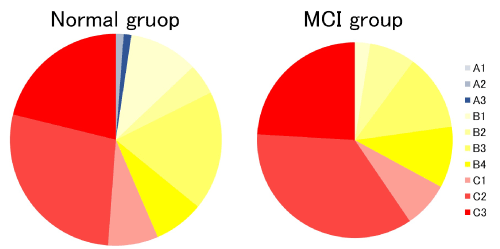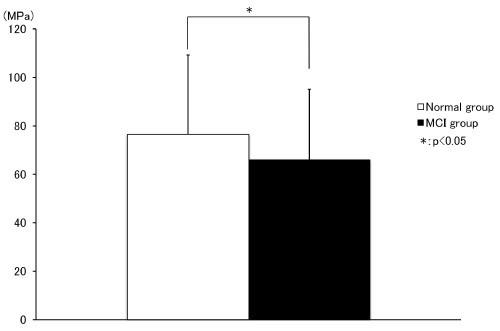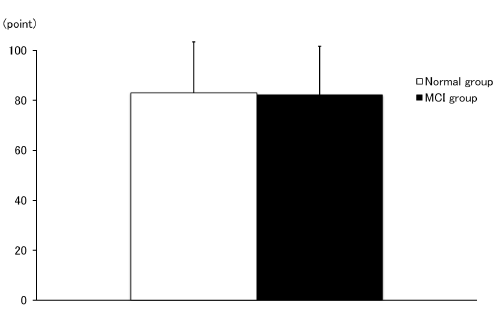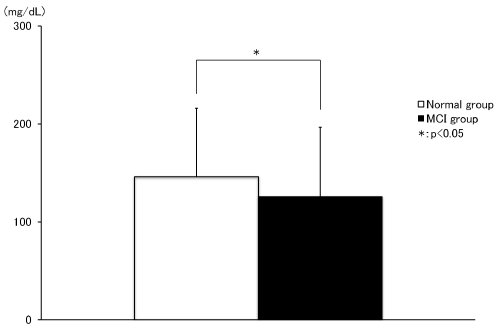Background: The purpose of this study is to reveal the relationship between mild cognitive impairment and oral function by investigating an epidemiologic survey of independent elderly people who wear removable dentures.
Materials and methods: 250 people who were at least 65 years and wore removable dentures were ultimately analyzed. Subject's oral function was investigated using dental prescale, a 25-food intake questionnaire and gummy jelly as a test food. The Mini-Mental State Examination was used to evaluate recognizing function.
Results: Subjects were separated into two groups: the normal group or the mild cognitive impairment group. The remaining teeth per individual was 11.0±8.6 in the normal group and 8.2±7.9 in the mild cognitive impairment group, indicating that those in the mild cognitive impairment group had significantly fewer teeth than those in the normal group. The mean value of maximum bite pressure and masticatory function with gummy jelly in the normal group was higher than those in the mild cognitive impairment group, whereas there was no significant difference in Masticatory Score.
Conclusion: In this study, it is clear that masticatory function in elderly people wearing removable dentures with mild cognitive impairment is reduced. To take in enough nutritients and activate cerebral function for prevention of cognitive dementia, oral care and maintenance of prosthetic appliances are important.
mild cognitive impairment, dementia, masticatory function, removable dentures
In 2012, the Ministry of Health, Labor and Welfare released findings indicating that the number of patients with cognitive dementia was estimated at 4.62 million and that the number of people at risk of cognitive dementia was estimated at 4 million in Japan and that these numbers were expected to increase significantly in the near future. Accordingly, policy regarding both treatment and prevention of cognitive dementia has been emphasized.
Intermedius status between normal and cognitive dementia is known as mild cognitive impairment (MCI) [1]. It has been reported that the annual conversion rate of MCI to dementia or Alzheimer's disease is approximately 12% [2]. Suppressing progression of impairment is essential for avoiding an increase in the number of cognitive dementia patients.
For prevention of cognitive dementia, nutritional intake and optimal physical exercise are very effective [3]. In terms of effective nutrition, DHA, vitamin E, and vitamin B12 have been shown to be useful for prevention [4]. Maintaining oral function and masticatory ability is also important for proper nutritional intake as it helps to prevent the development of an unbalanced diet. Unfortunately, it has been reported that patients with cognitive dementia have trouble with oral function, such as poor masticatory ability and swallowing [5]. However, details on oral condition and function in elderly people, especially those with MCI, are lacking. Oral function is involved with nutrient intake, and oral function disorder leads to malnourishment, weight loss, loss of muscle, and eventually frailty. Thus, early detection of oral malfunction in elderly people is important for the prevention of many kinds of problems including cognitive dementia.
As people age, the number of remaining teeth generally decreases [6], and prosthetic devices are required to restore both the form of the defect and its function. The ability of a removable prosthetic appliance depends on the condition of the host side such as the shape of the alveolar ridge, the property of the mucosa, the number and types of remaining teeth, and/or the condition of the material side, such as an adaptation (e.g., artificial teeth).
The purpose of this study is to reveal the relationship between MCI and oral function by investigating an epidemiologic survey of independent elderly people who wear removable dentures.
The study was conducted in a town in Hokkaido, Japan with a population of approximately 7000. We sent letters requesting participation in our study to 2244 people who were at least 65 years old and were not receiving care. Three hundred ninety-five people who agreed to participate were evaluated, and 250 people who wore removable dentures were ultimately analyzed.
Investigation of oral function
Remaining teeth and occlusal contact were checked. Subjects were then asked to bite down as hard as they could on a sheet of dental prescale (GC, Tokyo, Japan). The maximum biting pressure was analyzed by Occluser (GC, Tokyo, Japan).
Next, a 25-food intake questionnaire [7] was conducted and a Masticatory Score was calculated. Subjects assessed their own removable dentures using a visual analog scale (VAS) with the following items: satisfaction, suitability, pain, mastication, esthetics, and speech.
Finally, masticatory function of subjects was tested by using gummy jelly containing glucose as a test food [8]. Subjects chewed gummy jelly freely for 20 seconds and then rinsed their mouth with 10 ml water and spit all of the water and all of the crushed gummy jelly into a cup. Glucose eluted from the gummy jelly in the water was determined using an apparatus for measuring glucose density (GC, Tokyo, Japan).
Recognizing function evaluation
The Mini-Mental State Examination (MMSE) [9] was used to evaluate recognizing function. Subjects who scored from 0 to 26 points were placed in the MCI group and those who scored from 27 to 30 were placed in the normal group.
Statistical analysis
All data were analyzed by the Student’s t test or the Mann-Whitney U test. In all statistical analyses, p<0.05 was considered statistically significant.
Ethics committee approval
This study was approved by the Ethics Committee of the Health Sciences University in Hokkaido.
Subjects were separated into two groups: the normal group (170 subjects) or the MCI group (80 subjects). A summary is shown in Table 1. The remaining teeth per individual was 11.0±8.6 in the normal group and 8.2±7.9 in the MCI group, indicating that those in the MCI group had significantly fewer teeth than those in the normal group. There was also a significant difference in terms of average age in both of the groups.
Table 1. Summary of subjects.
| |
Normal group
(n=170) |
MCI group
(n=80) |
Gender
(Male/Female) |
0.43 |
0.70 |
Average age |
75.6±5.7 |
78.2±5.9* |
Mean remaining teeth per individual |
11.0±8.6 |
8.2±7.9* |
*: p<0.05
Both of the groups were classified using Eichner classification (Figure 1). The normal group had greater occlusal contact than the MCI group did. Naturally fewer people were in Class A because subjects wore removable dentures. The red area, which indicated Class C, is noticeable in the MCI group. Class C accounted for about 70% in the MCI group but less than 60% in the normal group.

Figure 1. Proportion of the number of subjects by Eichner classification.
On the other hand, in terms of the subjective assessment of removable dentures by the subjects, there was no statistical significant between the groups, but the scores of all six items in the normal group were higher than those in the MCI group (Table 2). Elderly people with MCI tend not to be satisfied by their removable denture.
Table 2. Comparison of self-evaluated denture scores by VAS (mean±S.D.).
|
Normal group
(n=170) |
MCI group
(n=80) |
Satisfaction |
67.0±30.1 |
62.0±34.4 |
Suitability |
64.1±33.5 |
55.5±37.5 |
Pain |
79.9±28.1 |
77.6±33.2 |
Mastication |
70.9±30.4 |
62.9±37.5 |
Esthetics |
77.1±24.5 |
72.9±29.4 |
Speech |
74.8±28.5 |
68.5±34.7 |
Finally, to determine maximum bite pressure, the Masticatory Score and masticatory function with gummy jelly were analyzed (Figures 2-4). The mean value of maximum bite pressure and masticatory function with gummy jelly in the normal group was higher than those in the MCI group, whereas there was no significant difference in Masticatory Score.

Figure 2. Comparison of maximum biting pressure.

Figure 3. Comparison of masticatory score.

Figure 4. Comparison of masticatory ability using gummy jelly as a test food.
The subjects in the MCI group were older than those in the normal group. It has been reported that as age increases, the ratio of cognitive dementia increases as well [10]. Regarding this point, our results related to age agree with the past studies. The ratio of females was higher in both groups because females probably tend to participate more actively in social events.
The number of remaining teeth in the MCI group was less than that in the normal group. As a prosthetic appliance gets larger due to an increase in the number of missing teeth, masticatory function decreases. Moreover, the function recovered by a prosthetic appliance depends on the status of maintenance of oral hygiene, including of the prosthetic appliance itself. Based on our findings related to remaining teeth, it is clear that maintenance of both teeth and dentures is important for elderly people with MCI. Fewer teeth and larger appliances in the MCI group may be the reason why all points of the MCI group on the VAS scale were lower than those of the normal group.
Masticatory function was also lower in the MCI group based on the gummy jelly results. These findings are probably related to the number of remaining teeth and the status of the prosthetic appliance. Maximum bite pressure was also lower in the MCI group. It has been reported that bite force and masticatory efficiency correlate to each other [11].
It is known that masticatory function is correlated with higher brain function. Mastication promotes learning and memory, spacial perception, cerebral blood flow, and even recovery of cerebral infarct [12-15]. Optical maintenance of masticatory function is worthwhile for not only nutritional intake but also for activation of cerebral function.
There was no significant difference in Masticatory Score. Because Masticatory Score is a subjective assessment, subjects who suffer from cognitive decline were probably not able to accurately judge whether they could sufficiently masticate foods in the questionnaire. Assessment of masticatory function must include not only subjective assessment but also objective assessment such as measurements using test foods.
In this study, it is clear that masticatory function in elderly people wearing removable dentures with MCI is reduced. To take in enough nutritients and activate cerebral function for prevention of cognitive dementia, oral care and maintenance of prosthetic appliances are important.
- Koshino H, Hirai T, Toyoshita Y, Yokoyama Y, Tanaka M, et al. (2008) Development of new food intake questionnaire method for evaluating the ability of mastication in complete denture wearers. Prosthodont Res Prac 7: 12-18.
- Kobayashi Y, Shiga H, Arakawa I, Yokoyama M (2006) The effectiveness of measuring glucose extraction for estimating masticatory performance. Prosthodont Res Prac 5: 104-108.
- Petersen RC, Doody R, Kurz A, Mohs RC, Morris JC, et al. (2001) Current concepts in mild cognitive impairment. Arch Neurol 58: 1985-1992. [Crossref]
- Petersen RC, Stevens JC, Ganguli M, Tangalos EG, Cummings JL, et al. (2001) Practice parameter: early detection of dementia: mild cognitive impairment (an evidence-based review). Report of the Quality Standards Subcommittee of the American Academy of Neurology. Neurology 56: 1133-1142. [Crossref]
- Trigiani LJ, Hamel E (2017) An endothelial link between the benefits of physical exercise in dementia. J Cereb Blood Flow Metab. [Crossref]
- Morris MC (2012) Nutritional determinants of cognitive aging and dementia. Proc Nutr Soc 71: 1-13. [Crossref]
- Tada A, Miura H (2017) Association between mastication and cognitive status: A systematic review. Arch Gerontol Geriatr 70: 44-53. [Crossref]
- Matsuyama Y, Aida J, Watt RG, Tsuboya T, Koyama S, et al. (2017) Dental Status and Compression of Life Expectancy with Disability. J Dent Res 96: 1006-1013. [Crossref]
- Folstein MF, Folstein SE, McHugh PR (1975) "Mini-mental state". A practical method for grading the cognitive state of patients for the clinician. J Psychiatr Res 12: 189-198. [Crossref]
- Levy R (1994) Aging-associated cognitive decline. Working Party of the International Psychogeriatric Association in collaboration with the World Health Organization. Int Psychogeriatr 6: 63-68. [Crossref]
- Uchida T, Shimoyama K, Nagao M, Odagiri K (1992) Questionnaire for evaluation of masticatory function complete denture wearer. Nihon Hotetsu Shika Gakkai Zasshi 36: 766-771.
- Miles C, Johnson AJ (2007) Chewing gum and context-dependent memory effects: a re-examination. Appetite 48: 154-158. [Crossref]
- Onozuka M, Watanabe K, Nagasaki S, Jiang Y, Ozono S, et al. (2000) Impairment of spatial memory and changes in astroglial responsiveness following loss of molar teeth in aged SAMP8 mice. Behav Brain Res 108: 145-155. [Crossref]
- Sakagami J, Ono T, Hasegawa Y, Hori K, Zhang M, et al. (2011) Transfer function analysis of cerebral autoregulation dynamics during jaw movements. J Dent Res 90: 71-76. [Crossref]
- Kawanishi K, Koshino H, Toyoshita Y, Tanaka M, Hirai T (2010) Effect of mastication on functional recoveries after permanent middle cerebral artery occlusion in rats. J Stroke Cerebrovasc Dis 19: 398-403.
Editorial Information
Editor-in-Chief
Shigeru Watanabe
Meikai University
Article Type
Research Article
Publication history
Received date: July 21, 2017
Accepted date: August 01, 2017
Published date: August 31, 2017
Copyright
© 2017 Toyoshita Y. This is an open-access article distributed under the terms of the Creative Commons Attribution License, which permits unrestricted use, distribution, and reproduction in any medium, provided the original author and source are credited.
Citation
Toyoshita Y, Kan Y, Sasaki M, Kawanishi K, Koshino K (2017) Relationship between Masticatory Function and Mild Cognitive Impairment in Elderly People Wearing Removable Dentures. Dent Oral Craniofac Res 3: DOI: 10.15761/DOCR.1000S2001
Corresponding author
Yoshifumi Toyoshita
Department of Removable Prosthodontics, School of Dentistry, Health Sciences University of Hokkaido, 1757 Kanazawa, Ishikari-Tobetsu, Hokkaido 061-0293, Japan
E-mail : bhuvaneswari.bibleraaj@uhsm.nhs.uk




